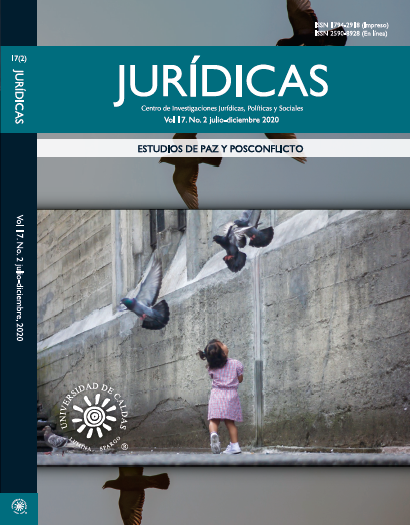Authors
Abstract
The state of the art of the legal framework for the protection of wetlands against climate change was constructed based on a bibliometric and network analysis using the Scopus® database as an instrument for the search of scientific documents. The most important subject areas come from environmental science. The most relevant research trends in this review regarding climate change were: a) the importance of wetlands and their impact; b) the environmental protection and conservation of wetlands and their effects on biodiversity; c) environmental management policies (restoration, conservation, protection of wetlands) and sustainable development. Other important aspects were identified, such as regional trends and territorial planning, carbon management, methane production, landscape indicators and effective participation as elements for environmental policies for the management, restoration, protection and conservation of these ecosystems.
Keywords:
References
Davis, C.L., Miller, D.A.W., Walls, S.C., Barichivich, W.J., Riley, J.W. & Brown, M.E. (2017). Species interactions and the effects of climate variability on a wetland amphibian metacommunity: Ecological Applications, 27(1), 285-296. DOI: 10.1002/eap.1442
Duque-Quintero, S.P., Quintero-Quintero, M.L. y Duque-Quintero, M. (2013). Participación de las comunidades en materia ambiental como estrategia para la conservación de la biodiversidad: el caso de los pescadores en la ciénaga de Ayapel (Córdoba). Jurídicas, 10(1), 164-180. Recuperado de http://190.15.17.25/juridicas/downloads/Juridicas10(1)_10.pdf
Evers, S., Yule, C.M., Padfield, R., O’Reilly, P. & Varkkey, H. (2017). Keep wetlands wet: The myth of sustainable development of tropical peatlands – implications for policies and management. Global Change Biology, 23(2), 534-549. DOI: 10.1111/gcb.13422
Finlayson, C.M., Capon, S.J., Rissik, D., Pittock, J., Fisk, G., Davidson, N.C., . . . Bino, G. (2017). Policy considerations for managing wetlands under a changing climate. Marine and Freshwater Research, 68(10), 1803-1815. DOI: 10.1071/MF16244
Gómez-Vargas, M., Galeano-Higuita, C. y Jaramillo Muñoz, D.A. (2015). El estado del arte: una metodología de investigación. Revista Colombiana de Ciencias Sociales, 6(2), 423-442.
Grygoruk, M. & Rannow, S. (2017). Mind the gap! lessons from science-based stakeholder dialogue in climate-adapted management of wetlands. Journal of Environmental Management, 186, 108-119. DOI: 10.1016/j.jenvman.2016.10.066
Hayri-Kesikoglu, M., Haluk-Atasever, U., Dadaser-Celik, F. & Ozkan, C. (2019). Performance of ANN, SVM and MLH techniques for land use/cover change detection at sultan marshes wetland, turkey. Water Science and Technology, 80(3), 466-477. DOI: 10.2166/wst.2019.290
Keddy, P. (2010). Wetlands: an overview. In: Wetland ecology: principles and conservation. New York: Cambridge University Press.
Lamsal, P., Kumar, L., Atreya, K. & Pant, K.P. (2017). Vulnerability and impacts of climate change on forest and freshwater wetland ecosystems in Nepal: A review. Ambio, 46(8), 915-930. DOI: 10.1007/s13280-017-0923-9
Li, T., Zhang, Q., Zhang, W., Wang, G., Lu, Y., Yu, L. & Zhang, R. (2016). Prediction CH4 emissions from the wetlands in the sanjiang plain of northeastern china in the 21st century. PLoS ONE, 11(7). DOI: 10.1371/journal.pone.0158872
Lin, Q. & Yu, S. (2018). Losses of natural coastal wetlands by land conversion and ecological degradation in the urbanizing chinese coast. Scientific Reports, 8 (1). DOI: 10.1038/s41598-018-33406-x
Melly, B.L., Gama, P.T. & Schael, D.M. (2018). Spatial patterns in small wetland systems: Identifying and prioritising wetlands most at risk from environmental and anthropogenic impacts. Wetlands Ecology and Management, 26(6), 1001-1013. DOI: 10.1007/s11273-018-9626-7
Mojica-Vélez, J.M., Barrasa-García, S. & Espinoza-Tenorio, A. (2018). Policies in coastal wetlands: Key challenges. Environmental Science and Policy, 88, 72-82. DOI: 10.1016/j.envsci.2018.06.016
Moomaw, W.R., Chmura, G.L., Davies, G.T., Finlayson, C.M., Middleton, B.A., Natali, S.M., . . . SuttonGrier, A.E. (2018). Wetlands in a changing climate: Science, policy and management. Wetlands, 38(2), 183-205.
Munévar-Quintero, C.A. (2013). La incidencia de la educación jurídica ambiental y la participación, en la transformación del conflicto ambiental. Jurídicas, 10(1), 147-163.
Munévar-Quintero, C.A. (2014). Escenarios de crisis y conflictos por efectos del cambio climático en la población asentada en la eco-región Eje Cafetero. Jurídicas, 11(1), 138-156.
Nachmany, M., Fankhauser, S., Setzer, J. & Averchenkova, A. (2017). Global trends in climate change legislation and litigation. Recuperado de http://www.lse.ac.uk/GranthamInstitute/wp-content/uploads/2017/04/Global-trends-in-climate-change-legislation-and-litigation-WEB.pdf
Panel Intergubernamental de Cambio Climático [IPCC]. (2014). Cambio Climático 2014. Mitigación del cambio climático. Resumen para responsables de políticas. Resumen técnico. Parte de la contribución del Grupo de trabajo III al Quinto Informe de Evaluación del Grupo Intergubernamental de Expertos sobre el Cambio Climático. Recuperado de https://archive.ipcc.ch/pdf/assessmentreport/ar5/wg3/WGIIIAR5_SPM_TS_Volume_es.pdf
Ramsar Convención sobre los Humedales. (2016). Manual de la Convenciòn Ramsar 5a ediciòn. Introducción a la convención sobre los humedales. Recuperado de https://www.ramsar.org/sites/default/files/documents/library/handbook1_5ed_introductiontoconvention_s_final.pdf
Ramsar. (17 de julio de 2020). Servicio de Información sobre Sitios Ramsar. Recuperado de https://rsis. ramsar.org/es/about?language=es
Ramsar Convention Wetlands. (28 de enero de 2020). La perspectiva global de los humedales. Recuperado de https://www.global-wetland-outlook.ramsar.org/
Roy-Basu, A., Bharat, G. K., Chakraborty, P. & Sarkar, S.K. (2020). Adaptive co-management model for the east kolkata wetlands: A sustainable solution to manage the rapid ecological transformation of a periurban landscape. Science of the Total Environment, 698. DOI: 10.1016/j.scitotenv.2019.134203
Sievers, M., Hale, R., Parris, K.M. & Swearer, S.E. (2018). Impacts of human-induced environmental change in wetlands on aquatic animals. Biological Reviews, 93(1), 529-554. DOI: 10.1111/brv.12358
Villa, J.A. & Bernal, B. (2018). Carbon sequestration in wetlands, from science to practice: An overview of the biogeochemical process, measurement methods, and policy framework. Ecological Engineering, 114, 115-128. DOI: 10.1016/j.ecoleng.2017.06.037
Xu, T., Weng, B., Yan, D., Wang, K., Li, X., Bi, W., . . . Liu, Y. (2019). Wetlands of international importance: Status, threats, and future protection. International Journal of Environmental Research and Public Health, 16(10). DOI: 10.3390/ijerph1610181
Zhang, Z., Zimmermann, N.E., Stenke, A., Li, X., Hodson, E.L., Zhu, G., . . . Poulter, B. (2017). Emerging role of wetland methane emissions in driving 21st century climate change. Proceedings of the National Academy of Sciences of the United States of America, 114(36), 9647-9652. DOI: 10.1073/pnas.161

 PDF (Español)
PDF (Español)
 FLIP
FLIP
 Perfil Google Scholar
Perfil Google Scholar





















